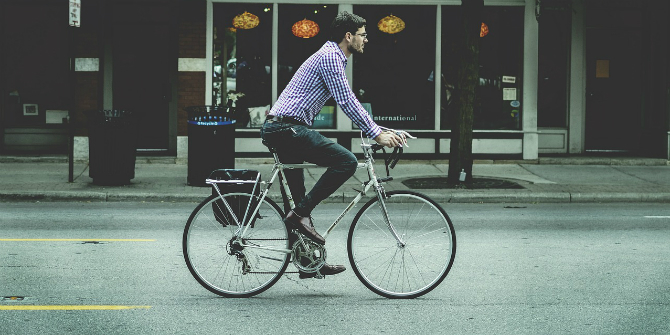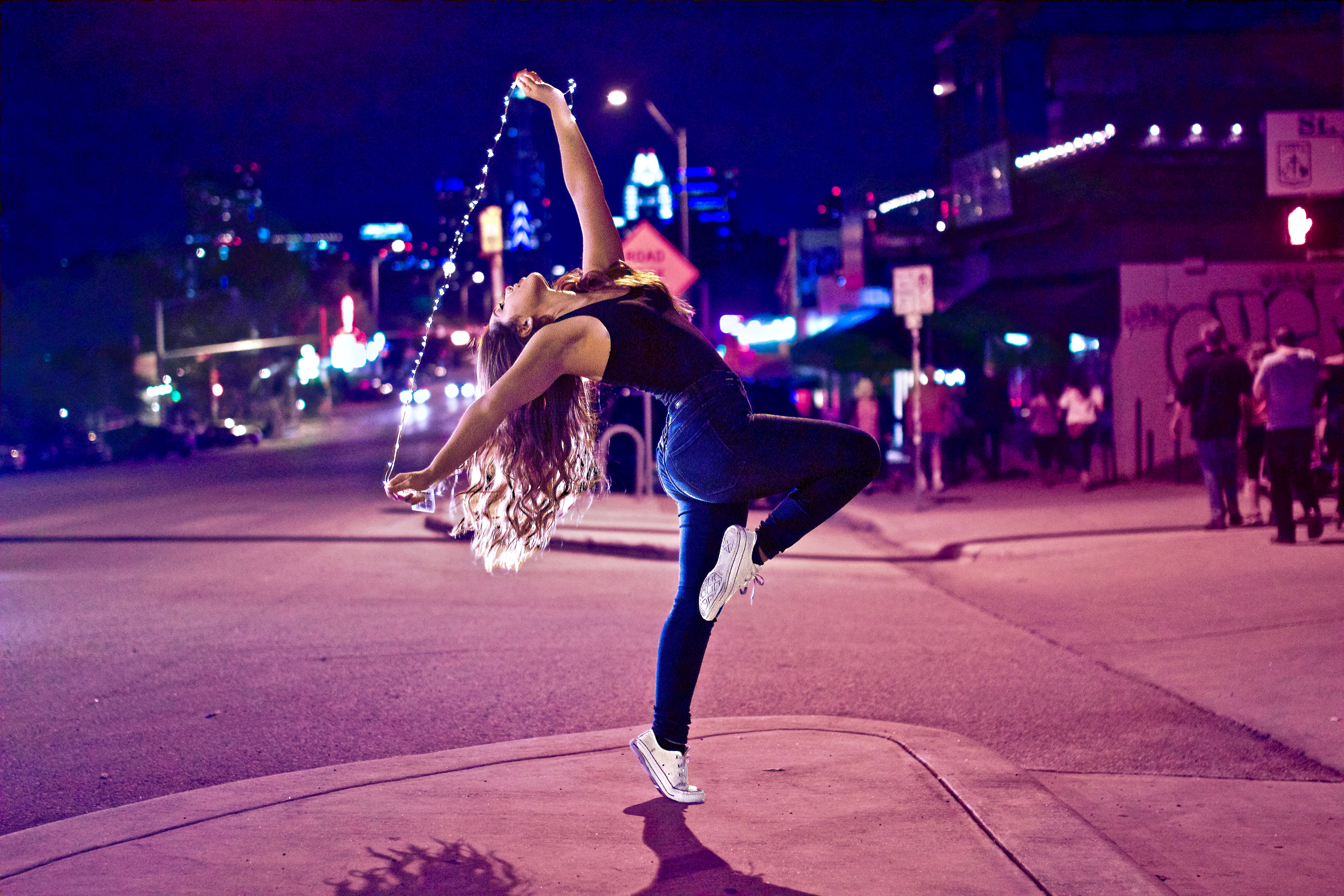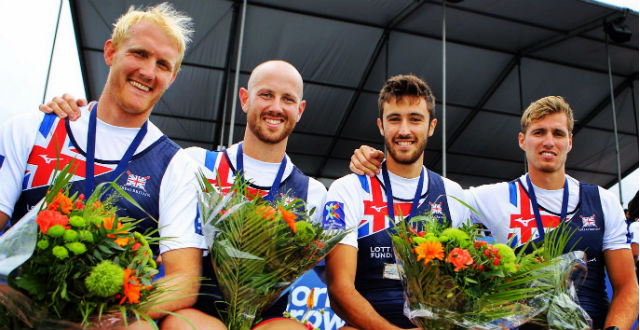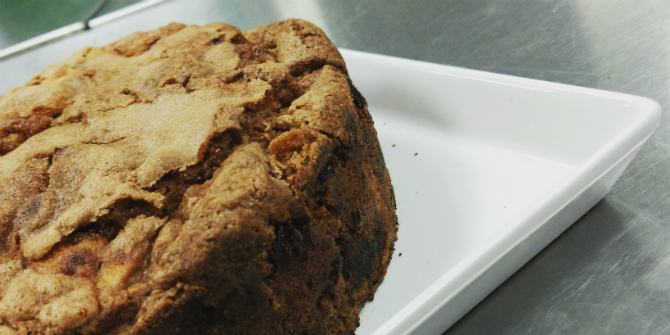“I hope to have an impact on people with sight impairments and show them that it doesn’t have to stop you from getting what you want”
Sooraya Walker and Mike Wilkerson meet Paralympic champion British rower Ellen Buttrick who shares her Paralympics experience at Tokyo 2020, and hopes on making an impact through her sport, and master’s at LSE.
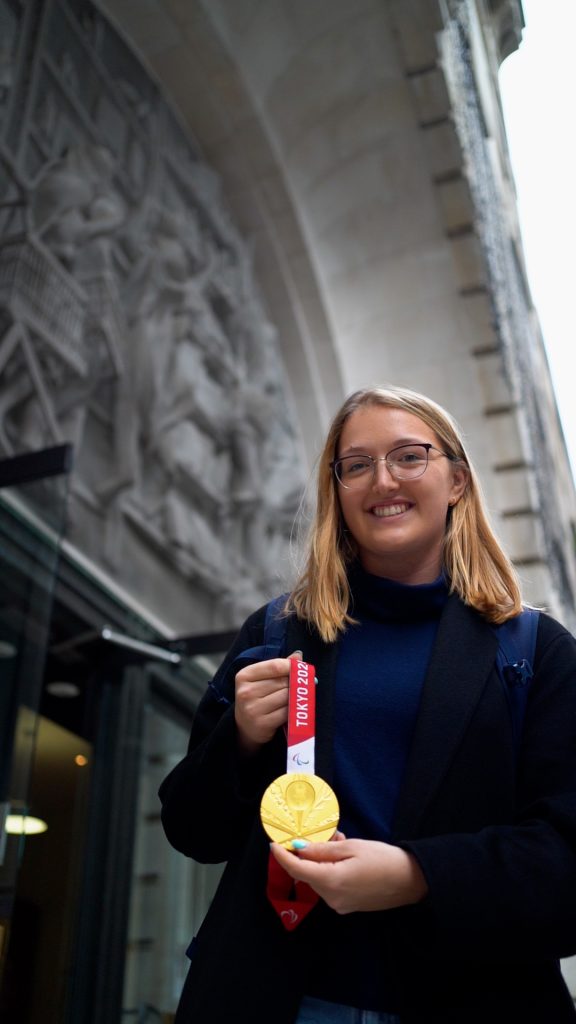
What’s your name and what are you studying?
I’m Ellen Buttrick, and I’m studying an MSc in Gender Policy and Inequalities.
Can you tell us about your experience at the Tokyo Paralympics?
It was an incredible experience. It was my first Paralympic Games. I was in the PR3 Mixed Coxed Four which is one of the rowing events, and I won a gold medal with my team. It was really incredible to be there and represent the country.
How was the whole experience at Tokyo 2020 this year? It must have been tough not having any fans there.
It was challenging not having as many fans there, I think because you have the support of your family and friends when you’re competing. I’ve been training for the Paralympics now for seven years, so to get there and not be able to share the moment was hard. But you definitely felt everybody back home supporting you. It also meant that you could really focus on the event and what you were doing because I don’t usually have my family come up to every competition anyway. In rowing, especially, we don’t have fans lining the entire 2000 metre racecourse, we have 250 metres of fans. There was a lot of Japanese volunteers who really liked GB, so they just sat in the stands and screamed GB to us for the last bit, and so it kind of felt like your family was there anyway.
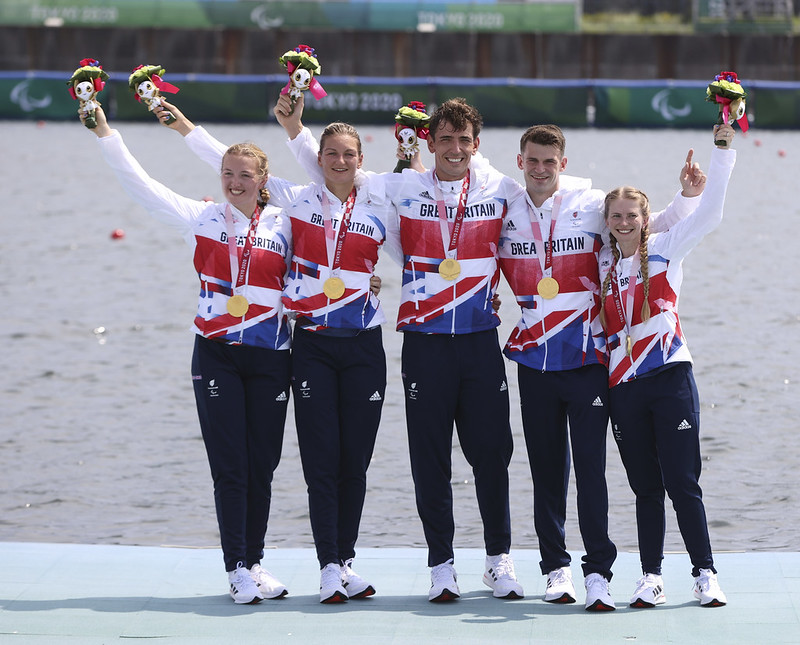
ParalympicsGB Rowers, Ellen Buttrick aged 26, from Leeds, Giedre Rakauskaite aged 30, from Worcester, James Fox aged 29, from Peterborough, Oliver Stanhope aged 23, from Hampton, Cox Erin Kennedy aged 29, from Wantage, win gold in the PR3 Mixed Coxed Four.” Copyright imagecomms 2021©, licensed under CC BY 2.0.
In your sport specifically, you have three other rowers in your team. What was it like being able to experience that win with them?
I’m in the PR3 Mixed Coxed Four. We’ve got four rowers and one Cox. There’s two men, two women and then the Cox is a woman. Crossing the finish line was a really incredible experience. We’ve been in that boat now for three years. Usually, you have a mix of every year, but we’ve been dominant in that boat. The GB Four has won eleven years in a row and we’ve got this legacy that we have to uphold. We’ve got a lot of pressure on our shoulders, but we hold ourselves accountable and we make sure that we train really hard, and we do everything that we can do to win. When we crossed that finish line and were eleven seconds ahead of the US, who are our biggest competition, we were so happy that the hard work had paid off.
You have a condition called Stargardt Disease, tell us a bit more about that.
Stargardt Disease is a form of juvenile macular degeneration, which means that your central vision is blurred. I got diagnosed when I was 19. I was doing my undergrad degree and I kept on not being able to read the board in lectures. I went to like loads of different opticians. They were like, “Oh no, you’re fine, you’re fine”. Then eventually I said to them, “look, I can’t see the board”, and they sent me to the hospital and diagnosed me with this disease. I was like, “oh well, that means I can go to Paralympics”. So, I finished my degree, and then I went to train with the GB team to try and get into the Paralympics. It just means that I can’t drive and I can’t see the board, so I have to use technology on my laptop to zoom in on everything. I’m just starting my master’s now and the technology is so much better than it was five years ago. So, I’m finding it so much easier.
I read somewhere that you weren’t actually into sports. When did you find out about rowing and what made you want to go down this road?
I watched the London 2012 Olympics and Paralympics, and during the week of the Olympics I actually started rowing at my local club. Even though I wasn’t massively sporty, and my family aren’t sporty, I did like being the best or like doing my best. When I found rowing, I found something where I could work hard and I could get the result. I don’t know if it’s because I’ve got the right height and the right arm length, but it just worked and it clicked for me. I watched the Olympics and I really enjoyed that, and GB were really successful, especially the women’s squad. And then I watched the Paralympics and I was like, gosh that’s really incredible, if I had a disability, I’d love to be representing my country at a Paralympics and making the most of that. Then two years later, when I was diagnosed, I was like, “right, I’m going to have to go to the Paralympics now” because I said I would if I had a disability. I’d thrown the gauntlet down and I had to do it.

“ParalympicsGB Rowers, Ellen Buttrick aged 26, from Leeds, Giedre Rakauskaite aged 30, from Worcester, James Fox aged 29, from Peterborough, Oliver Stanhope aged 23, from Hampton, Cox Erin Kennedy aged 29, from Wantage, win gold in the PR3 Mixed Coxed Four.” Copyright imagecomms 2021©, licensed under CC BY 2.0.
We are here at LSE and you’re doing your master’s, what made you want to come to this university?
I was interested in my course Gender Policy and Inequalities and worked before I started rowing, in the charity sector. I’d seen a lot of things that I felt needed changing, and I hoped that by coming to do this course, I might be able to influence that once I finish rowing. This is one of the best schools for my course in the world, and it’s only like an hour away from where I live and so I absolutely wanted to come here. I couldn’t believe it when they accepted me. I started crying actually. I really didn’t believe it would have me, but they did. So here I am.
How are you finding it so far?
It was hard to start with, but I think I’m getting the hang of it now because I’m doing the course part time and juggling it with training. Having to go to training and then get the train to LSE, and then trying to read whilst you’re tired from training. I’m trying to make sure I give everything 100%.
How do you manage the balance of training and studying?
Well, we have a lot of breaks in between training sessions, so we do two or three sessions a day usually, but we have an hour to an hour and a half in between sessions. You have to recover to be able to do the next session properly. There’s a quiet room at the boathouse where anyone studying usually goes in there, and we all just sit on our laptops and do work. So, I’m going to be doing work in between sessions, and then when I get home, I’ll have a nap because that’s what you do when you’re an athlete. Then I’ll continue study. I’ve not been doing it for too long, but I hope that it will work out fine. In terms of the academic calendar, it looks as though any competitions are not when I’m meant to be in lectures, which is good.
You have a real passion for volunteering and charitable work, can you tell us more about that?
I worked for the Refugee Council before I joined the GB Rowing Team, so when I moved down to Reading from Leeds to row full time, I decided I wanted to do a lot of volunteering to keep up that work. I’m funded by the National Lottery and very fortunate to have that. It means that I can just spend all day training and then just lying about if I wanted to but I decided to do a master’s. I wanted to volunteer before, so I volunteered with a refugee charity in Reading which helped people who were homeless to find rooms in other people’s houses that had spare rooms. During the COVID-19 pandemic, I did a lot of volunteering in my community because we weren’t allowed to go to training. Like for everyone else, the rowing team shut down. We had to take our machines home and train in our kitchens with what we could get. I went and bought two big sandbags and I was doing weights with sandbags. I realised I’ve got so much more time now as I’m not even going to training. I always just think that you need to come together when there’s a crisis, and I think the UK did that. I tried to champion that in my town, which is Henley-on-Thames because when I was growing up in Leeds, we had a really good community spirit and I didn’t find that when I moved to the South. But I think we’ve got it now, so that’s fine.
What kind of impact do you want to have on the world in the future?
I hope that through my sport to start with, I can have an impact on people with sight impairments and show them that it doesn’t have to stop you from getting what you want and that you can achieve anything you want. There are processes in place to help you. I found that when I came to LSE, the disability support team were able to help me and show me what was best. Someone in the Library will take me to find my books. There’s all the support if you ask for the help, and a lot of people don’t realise that. When I was diagnosed with my sight impairment, rather than thinking I’ll go and achieve something, I could have shut down and thought that’s it, I can’t do anything else. I want to be a role model for people who have sight impairments or disabilities. Then when I finish rowing, whenever that will be, I hope to work for a charity again and that I can apply what I learn here to that role.
The Paris 2024 Olympics is not far away. What are your ambitions for the future?
I do hope to go to Paris, it’s three years away. We’re not going to start training fully until January, and it’s October now, so I’m having a little bit of a break still. Then I’m going to be training full time and I have to try to get into the boat. We’ve got one year to trial into the boat and just because I won a gold medal doesn’t mean I’m going to be in the boat because I might not be the fastest person anymore. Because we did so well, a lot of people want to have a go at it. So, I’ve got a lot of people coming to trial for my seat. Next year, we have to qualify the boat for Paris. I think if I could graduate with a master’s and go to Paris and get a gold medal, then I’ve probably won at life.


